According to media reports, Chinese researchers have developed a strategy to disrupt the Starlink satellite network in wartime. The Starlink satellite networks are of SpaceX and owned by Elon Musk. The researchers can disrupt these satellite networks by using AI-powered simulations inspired by the hunting technique. This disruptor technology could allow China to neutralize the Starlink satellite network’s military advantages. The military capability of Starlink has become a cause for concern for many countries especially due to its effects in the ongoing Russia-Ukraine war.
Reports say that the Chinese research team, led by Wu Yunhua from Nanjing University of Aeronautics and Astronautics, simulated an operation. The simulated operation effectively used 99 satellites to target 1400 Starlink satellites within 12 hours. This study was later published in a Chinese academic journal, Systems Engineering and Electronics. The study includes how these satellites could track and potentially disable Starlink using directed-energy weapons like lasers and microwaves.
According to the researchers, they have developed a binary AI algorithm inspired by whales’ hunting behaviour, which channels prey into a confined area for efficient capture. Similarly, the algorithm enables Chinese satellites to coordinate manoeuvres and optimize energy use, precisely tracking Starlink units. This approach reduces the computational complexity of targeting a vast constellation and allows for rapid action planning, which can be completed in under two minutes.
China is exploring various tools for satellite disruption, including high-power microwave weapons like the Relativistic Klystron Amplifier (RKA) and solid-state lasers. While these technologies are promising, they face significant challenges, such as energy demands and overheating. Other advanced systems, such as X-ray lasers inspired by the US’s Strategic Defense Initiatives, are also under consideration.
Why the Chinese are doing this?
Starlink’s decentralized satellite constellation has proven critical for battlefield communications. It has enabled high-speed data transfer and resilient coordination, making it a target in potential conflicts like those involving Taiwan. Starlink has not only redefined space-based communication in modern warfare but also offered strategic advantages.
The world has seen the miltary uses of Starlink in Ukraine’s defence against Russia. It restored the internet in areas where Russia destroyed communication networks. Ukrainian forces used it to coordinate operations and control drones. Civilians relied on it to stay connected and access information. Humanitarian groups used Starlink for relief efforts. The system resisted Russian cyberattacks and jamming. SpaceX quickly sent thousands of terminals to Ukraine, supported by international funding. Starlink showed the power of satellite internet in modern conflicts.
Its dominance in satellite internet technology has drawn admiration and scrutiny. It has provided another level of global connectivity, even in remote, conflict-affected areas. China’s strategy to counteract Starlink outlines the growing importance of space superiority in geopolitical conflicts. China is preparing for a potential Taiwan Strait crisis; if successful, it could disrupt adversaries’ communications, shifting the balance during military engagements and showcasing how advancements in AI and space technology are shaping the future of warfare.
What the world can learn?
Critics warn that over-reliance on Elon Musk’s centralized control poses risks, particularly given his unpredictable decision making and his deep business ties to China. It has prompted Taiwan and the European Union to pursue independent satellite programs. The EU allocated $2.6 billion for its own constellation to ensure technological sovereignty.
Musk’s increased involvement in the domestic politics of different countries also poses a threat on the sovergnity of nations. Putting military security into a single hand will not only potentially make that person a ‘kingmaker’ but also limit the sovereign features of the state. This situation is not only problematic for other countries but also for the US.
Musk has consistently shown his interest to meddle in the internal affairs of nations, he has previously said “We coup whoever we want.” Recently, Musk was actively involved in the UK and German politics. Musk asked UK’s PM Keir Starmer to resign. He also endorsed a German anti-immigration party ahead of elections slated in February. The leaders of these countries have expressed their concerns in Musk’s constant meddling in their internal politics. Keeping in mind all these events, governments around the world have to limit Starlink’s monopoly.
Another shocking incident was observed in India, when Starlink technologies, such as Starlink routers were found with militants. The security forces also seized a Starlink router and antenna, a product of Elon Musk’s SpaceX company, which is used to give uninterrupted global internet and communication access. The find raises major security concerns as the Starlink technology has already been flagged by many analysts as a very dangerous tech that can be used to destabilize entire regions.
Providing internet where there is no internet allowance by the government or the internet infrastructure has been destroyed by conflict or war is a serious threat to the government’s sovereignty and a threat to national security. This can also be used by non-state actors to inflict or spread violence.
China’s move to develop and deploy tech that can manage and counter the effect of Starlink seems to now be a major necessity for world powers. The ability to blast Starlink satellites in orbit will give China an edge whenever it seeks to defy western powers. Russia already has its own Starlink killer, now China too has the ability to counter Musk and his tech. It wont be long until other nations who want to remain sovereign and have their own control over their borders will seek to have their own deterrence against Musk’s Starlink system.







